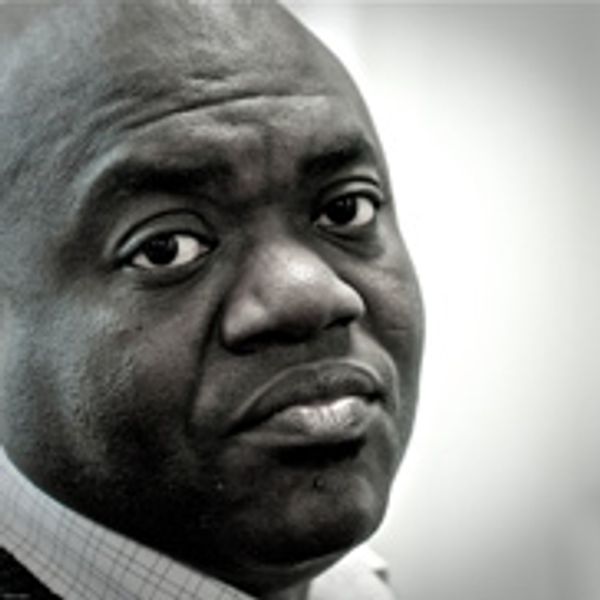Art by Jin Suk
Introduction to The AGNI Portfolio of African Fiction
The idea seemed natural and easy when we were sitting together in a bar: we would gather fiction from several sub-Saharan nations by tapping writers that E. C. Osondu follows and admires. (E. C. won the Caine Prize for African Writing—the “African Booker”—two years after his AGNI story “Jimmy Carter’s Eyes” put him on the shortlist.) We would aim for breadth without attempting a quixotic “representativeness.” We would publish roughly half of the resulting portfolio in the fall 2010 print issue and the other half at AGNI Online. And we would still get some sleep at night.
That was almost six months and fifty stories ago. Even the original list of potential contributors seemed ambitious, but as we went asking for fiction—something AGNI rarely does—those we contacted led us, again and again, to other admired and innovative writers. The list grew, reminding E. C. of the party invitations he received while growing up in Nigeria, which typically bore the legend: “Come One, Come All. Beer and Food Inexhaustible.”
Something, it’s clear, is afoot in African fiction. What these stories seem to announce is a powerful narrative outlook that has almost nothing to do with the West’s expectation of “Africanness.” Instead, it rises from the coming together of individual voices that happen to be broadly, variously African, writers with a straight-on, self-probing honesty and a poetic sort of thoroughness. Not African streets, African emigration, African love or violence—the adjective pre-flavored for us by Save the Children infomercials and centuries of myth and distance—but, simply, an African’s vision or experience of these things, of home, flight, return, death, disappointment, ecstasy, compromise.
As the stories accumulated, we began, in spite of ourselves, to see a portrait emerging: a pastiche or collage, but one in which there was surprisingly little repetition, except of the kind that suggests, in a mosaic, that the tiles belong together. If what we were seeing wasn’t anything we’d brand as “Africanness,” it for sure wasn’t American or Latin American or European or Asian—even when the stories’ settings moved beyond the African continent. But just as we can point to something European in writers as different and far-flung as Ireland’s Flann O’Brien, Poland’s Witold Gombrowicz, and Turkey’s Orhan Pamuk, we can begin, tentatively and without needing to generalize, to talk about something African that links stories as diverse as ours from Uganda, South Africa, Nigeria, Djibouti, The Gambia, and moving to the online half of the portfolio, Botswana, Kenya, and Zimbabwe.
No matter their style or approach, these stories take on the religious, financial, militaristic, bureaucratic, and domestic arrangements of their several African societies (whether nation, city, or village) with a directness that—to a reader of recent American fiction—feels courageous and often breathtaking. The great surprise, though, is how often the themes—even ones uncommon in U.S. fiction—are in fact available to writers here. That is, where we might expect the underlying subjects to be foreign—glimpses of another world—they are more often explorations of phenomena present in American life also, if too often banished to the “genre” category in our contemporary fiction.
How is it that writing about anything “current” seems mainly a job, in the States, for satirists, journalists, and formulaic, commercial novelists, while many of the writers in this portfolio explore Africa’s cultural schisms so persistently that their refusal to look away can seem part of what renders these stories “African”? Rape that goes by other names, police who treat their towns as fiefs, the dislocations wrought by globalization and overdevelopment, the frictions between ethnic groups or political or religious systems—just to mention a few of the subjects unabashedly tackled by these stories. The United States has them all, but most often (there are exceptions, of course) writers who aim for the literary marketplace stay clear.
Though their cultural experiences vary widely, nearly all of these writers seem formed by an intimate knowledge of disjunctions and collisions, of this coming up against that. They give life to these themes without vilifying or romanticizing their characters. They know their circumstances intimately, and their work discloses the full range of joys and tribulations and dilemmas they find around them.
The result—what we see here—is freshness, a feeling that the expressive future is still open. Maybe it’s that the media juggernaut has not yet worn in its paths of least resistance. Or maybe, with no prior Golden Age of written fiction—none before Paton and Achebe— these African writers are still intent on establishing relevance for the first time. Or maybe they have not fallen victim, as so many have here, to professionalism—the curse of believing, for instance, that particular academic qualifications are a must for a writer. Among the contributors to this portfolio are an editor, a lawyer, former political prisoners, a financial consultant, a UNESCO staffer, and others who write alongside day-careers—and do so from a palpable belief in the importance, the necessity, of telling.
We can only hope for this same spirit for writers everywhere.
The art feature by Victor Ekpuk extends the idea of storytelling to other media. Like the fiction it accompanies, his “manuscripts” bring the sacred and the everyday into a casual, comfortably worn unity. He calls his work “visual poetry.” When we first looked at it together, E. C. waved his hand across the pictographs and said, “And the stories they tell are so good.”
Please, after reading the stories available online, make your way to the print half of the portfolio by ordering AGNI 72. The portrait isn’t complete without it.

E. C. Osondu
E. C. Osondu was born in Nigeria, where he worked for many years as an advertising copywriter. Winner of the 2009 Caine Prize for African Writing, he is the author of a novel, This House Is Not For Sale (Harper, 2015), and two story collections: Alien Stories (BOA Editions, 2021), winner of the BOA Short Fiction Prize, and Voice of America (Harper, 2010). His stories have appeared in The Atlantic, Guernica, AGNI, and elsewhere. He is professor of English at Providence College in Rhode Island and a contributing editor of AGNI. (updated 4/2024)
Osondu’s first two published stories appeared in AGNI: “A Letter from Home”, later named one of the Top Ten Online Stories of 2006 by storySouth, and “Jimmy Carter’s Eyes”, which became a finalist for the Caine Prize. With William Pierce, he co-edited The AGNI Portfolio of African Fiction.
Read a conversation between Osondu and Pierce at Critical Flame.

William Pierce
William Pierce is coeditor of AGNI. His short stories have appeared in Granta, Ecotone, American Literary Review, and elsewhere. Excerpts from his novel Twenty Sixteen can be found in Harvard Review, The Western Humanities Review, and on the Freeman’s channel at Literary Hub. Other work has appeared in Electric Literature, Little Star, Tin House online, The Writer’s Chronicle, Solstice, Glimmer Train, Consequence, and as part of MacArthur Fellow Anna Schuleit Haber’s art project “The Alphabet,” commissioned by the Fitchburg Art Museum. Pierce is the author of Reality Hunger: On Karl Ove Knausgaard’s My Struggle (Arrowsmith Press, 2016), a monograph first serialized as a three-part essay at The Los Angeles Review of Books. More at williampiercewriter.com. (updated 4/2025)
His first essay for AGNI, “Fabulously Real,” received special mention in the 2006 Pushcart Prize anthology. His introduction to AGNI 91, “The Peculiarities of Literary Meaning,” is cited in the 2022 Pushcart anthology, and his introduction to AGNI 98, “Looking Out for Humanity,” is listed as Notable in The Best American Essays 2024. He is interviewed here at NewPages.com. With E. C. Osondu, he coedited The AGNI Portfolio of African Fiction.
